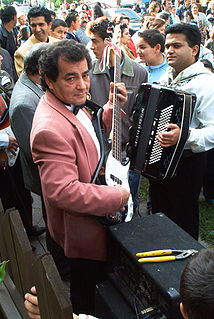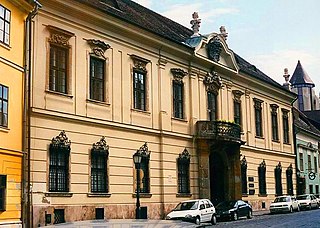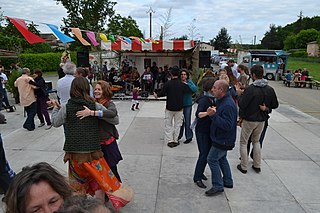
The performing arts are arts such as music, dance, and drama which are performed for an audience. They are different from the visual arts, which are the use of paint, canvas or various materials to create physical or static art objects. Performing arts include a range of disciplines which are performed in front of a live audience, including theatre, music, and dance.
The polka is originally a Czech dance and genre of dance music familiar throughout all of Europe and the Americas. It originated in the middle of the nineteenth century in German and Austrian influenced Bohemia, now part of the Czech Republic. The polka remains a popular folk music genre in many western countries, and is performed by many folk artists.

Romani music is the music of the Romani people who have their origins in northern India but today live mostly in Europe.
The Gentse Feesten is a music and theatre festival in the city of Ghent, Belgium. Besides stage events there are street acts such as mimes and buskers. The festival starts on the Friday before the third Sunday of July and lasts until and including the fourth Sunday of July. The date originally had no reference to July 21st, Belgium's national holiday, but that holiday is always included. The festival starts on "the (Fri)day before the Saturday before July 21st" and lasts ten days. The last day is known as de dag van de lege portemonnees alluding to the fact that many people have spent their last penny at the festival and is seen by the people of Ghent as "their" day while visitors leave.

A promenade dance, commonly called a prom, is a dance party for high school students. It may be offered in semi-formal black tie or informal suit for boys, and evening gowns for girls. This event is typically held near the end of the school year. There may be individual junior and senior proms or they may be combined.
In France, music reflects a diverse array of styles. In the field of classical music, France has produced several prominent romantic composers, while folk and popular music have seen the rise of the chanson and cabaret style. The earliest known sound recording device in the world, the phonautograph, was patented in France by Édouard-Léon Scott de Martinville in 1857. France is also the 5th largest market by value in the world, and its music industry has produced many internationally renowned artists, especially in the nouvelle chanson and electronic music.

Cajun music, an emblematic music of Louisiana played by the Cajuns, is rooted in the ballads of the French-speaking Acadians of Canada. Although they are two separate genres, Cajun music is often mentioned in tandem with the Creole-based zydeco music. Both are from southwest Louisiana and share French and African origins. These French Louisiana sounds have influenced American popular music for many decades, especially country music, and have influenced pop culture through mass media, such as television commercials.
The music of Belgium is a cultural mix where Flemish Dutch-speaking and Walloon French-speaking traditions mix with those of German minorities and of immigrant communities from Democratic Republic of the Congo or other distant countries.
The music of Saint Lucia is home to many vibrant oral and folk traditions and is based on elements derived from the music of Africa, especially rhythmically, and Western Europe, dances like the quadrille, polka and waltz. The banjo and cuatro are iconic Lucian folk instruments, especially a four-stringed banjo called the bwa poye. Celebratory songs called jwé show lyricism, and rhythmic complexity. The most important of the Afro-Lucian Creole folk dances is the kwadril. Music is an integral part of Lucian folk holidays and celebrations, as well as the good-natured rivalry between the La Rose and La Marguerite societies. There is little Western classical music on Saint Lucia, and the country's popular music industry is only nascent. There are few recording opportunities, though live music and radio remain a vital part of Lucian culture. Popular music from abroad, especially Trinidadian styles like calypso and soca, is widespread.

Music of Goa refers to music from the state of Goa, on the west coast of India. A wide variety of music genres are used in Goa ranging from Western art music to Indian classical music. Konkani music is also popular across this tiny state. Being a former territory of Portugal, Goa has a dominant western musical scene with the use of instrument such as the violin, drums, guitar, trumpet and piano. It has also produced a number of prominent musicians and singers for the world of Indian music. Portuguese Fado also has significance in Goa.

Budapest has long been an important part of the music of Hungary. Its music history has included the composers Franz Liszt, Ernő Dohnányi, Zoltán Kodály and Béla Bartók and the opera composer Ferenc Erkel.

Jatra is a popular folk-theatre form of Odia theatre, Bengali theatre, spread throughout most of Odia, Bengali speaking areas of the Indian subcontinent, including Bangladesh and Indian states of Odisha, West Bengal, Bihar, Assam and Tripura As of 2005, there were some 55 troupes based in Calcutta's old Jatra district, Chitpur Road, and all together, jatra is a $21m-a-year industry, performed on nearly 4,000 stages in West Bengal alone, where in 2001, over 300 companies employed over 20,000 people, more than the local film industry and urban theatre.

The term Creole music is used to describe both the early folk or roots music traditions of rural Creoles of Louisiana.

Sensation is an indoor electronic dance music event which originated in Amsterdam, Netherlands, and organized by ID&T. The original event, which ran exclusively in the Amsterdam Arena for a period of five years until 2005, is now located throughout various European and a few non-European countries.

Dance in Burma can be divided into dramatic, folk and village, and nat dances, each having distinct characteristics. Although Burmese dance resemble the traditional dancing style of its neighbours, in particular Thailand, it retains unique qualities that distinguish it from other regional styles, including angular, fast-paced and energetic movements and emphasis on pose, not movement.

BalFolk is a dance event for folk dance and folk music in a number of European countries, mainly in France, Belgium, the Netherlands, Germany, Italy and Poland. It is also known as folk bal.
Film Fest Ghent, spelt Film Fest Gent in Flemish and also known as International Film Fest Gent, is an annual international film festival in Ghent, Belgium. The festival held its first edition in 1974, under the name Internationaal Filmgebeuren Gent, and has since grown into the largest film festival in Belgium. The festival also puts the spotlight on film music; since 2001, Film Fest Ghent has hosted the World Soundtrack Awards, a series of prizes for the best soundtracks for film and television.
Waves is the annual cultural festival of BITS Pilani, K K Birla Goa Campus. It is a three-day-long festival held in the late October – early November period. It is a cultural festival that is held annually to celebrate music, dance and art. It is an inter college festival with students coming in to participate in events and competitions from across the country.










